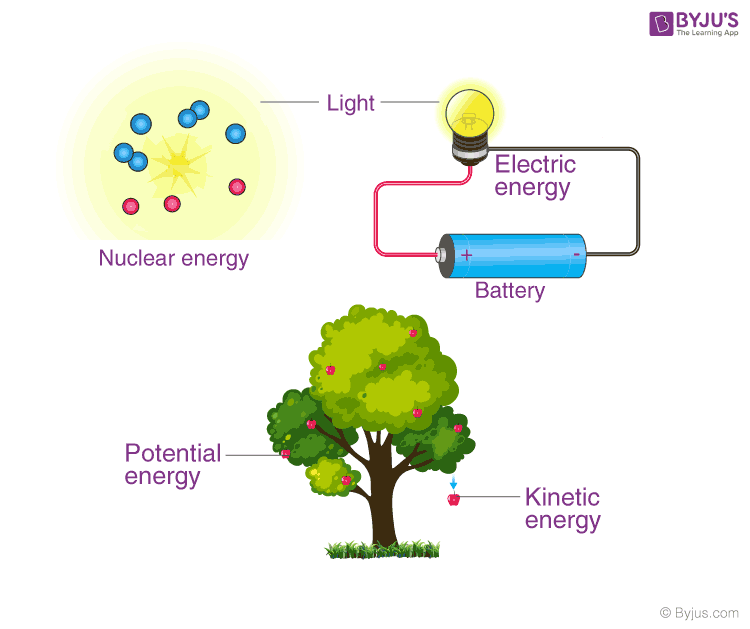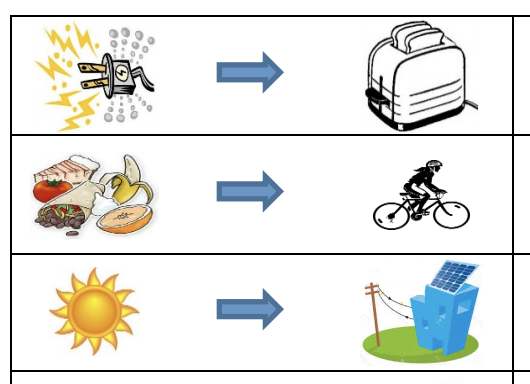Conservation Of Energy Study Guide
INTRODUCTION
Have you ever wondered where all the energy that runs the world and the natural processes in the environment comes from? Or where it goes? If your first guess is the sun, you would be right, but, partially. The sun doesn’t create any of the energy that we receive on Earth; it merely transforms it from nuclear energy to heat, light, and other forms of radiation. That is also what happens on Earth- energy only circulates; it is neither created nor destroyed. Let’s take a look at the nature of energy and the law of conservation of energy.
WHAT IS ENERGY?
- In simple terms, energy is the capacity to do work.
- That could mean anything from moving an object from one place to another, bringing a moving object to stop or to even change the shape of objects.
- You will have to expend energy to kick a football on the ground.
- The ball is at rest, and your kick transfers a certain amount of kinetic energy to the ball to get it moving.
ENERGY AND CLASSIFICATION OF ENERGY
Energy occurs in different forms such as:
-
Chemical energy: Energy stored in the reactants of a chemical reaction.
-
Electrical energy: Energy carried by moving electrons in power lines and circuits.
-
Mechanical energy: Energy stored in physical form such as in a spring under tension or a flywheel.
-
Thermal energy: Energy in substances that occurs in the form of heat, such as cooking stoves.
-
Nuclear energy: This is the energy that exists as atomic bonds. The sun’s heat and light comes from nuclear energy.
THE LAW OF CONSERVATION OF ENERGY
- According to the law of conservation of energy, in a closed system, energy can neither be created nor destroyed; it can only transform from one state to another.
- Think of a closed system as an isolated space or bubble that cannot exchange any form of heat, work, or matter with its surroundings.
- Within such a system, energy cannot enter or leave. Therefore it cycles in the processes happening within.
The conservation of energy formula is given by
UT = Ui + W + Q
Here,
UT is the total energy within the system
Ui is the initial energy of the system
W is the work done by/on the system
Q is the flow of heat to or from the system
SUMMARY
- Energy is the capacity to do work.
- Energy can exist in many forms, such as potential energy, kinetic energy, and chemical energy.
- Energy can be transformed from one form to another.
- According to the law of conservation of energy, in a closed system, energy can neither be created nor destroyed; it can only transform from one state to another.
FAQs
Q. What are the ways in which energy can be transferred?
Energy can be transferred in following ways:
- The chemical energy of batteries can be converted into electrical energy. This electrical energy can be converted into mechanical energy in a motor or into thermal energy by using a resistance coil.
- Gravitational potential energy stored in a reservoir can be converted into mechanical energy in turbines to generate electrical energy at a power plant.
We hope you enjoyed studying this lesson and learned something cool about Conservation of Energy! Join our Discord community to get any questions you may have answered and to engage with other students just like you! Don’t forget to download our App to experience our fun, VR classrooms – we promise, it makes studying much more fun! 😎
REFERENCES
- Conservation of Energy: https://flexbooks.ck12.org/cbook/ck-12-physics-flexbook-2.0/section/6.7/primary/lesson/conservation-of-energy-phys/ Accessed 11th April 2022.
- Energy: https://flexbooks.ck12.org/cbook/ck-12-middle-school-physical-science-flexbook-2.0/section/14.1/primary/lesson/energy-ms-ps/?referrer=crossref Accessed 11th April 2022.
- Law of Conservation of Energy: https://byjus.com/physics/law-of-conservation-of-energy/ Accessed 11th April 2022.
- Conservation of Energy: https://courses.lumenlearning.com/physics/chapter/7-6-conservation-of-energy/ Accessed 11th April 2022.
- What is Conservation of Energy? https://www.khanacademy.org/science/physics/work-and-energy/work-and-energy-tutorial/a/what-is-conservation-of-energy Accessed 11th April 2022.
- Forms of Energy: https://vikaspedia.in/energy/energy-basics/forms-of-energyAccessed 11th April 2022.


